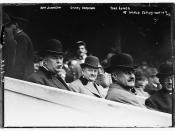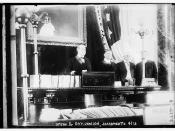It's understandably difficult to pin one set of values to the Philosophes because their range of
ideas, opinions, and beliefs were so wide. Not all Philosophes emerged from a kind of social-activist
mold. Voltaire, for instance, was a harsh critic of Enlightenment optimism, but he didn't share Rousseau's
claim that the arts and sciences were nothing more than "garlands of flowers [thrown] on iron fetters."
(Kramnick 363) Similarly, although the idea of a perfect God creating a perfect world whose flaws were
nothing but goodness in disguise angered Voltaire, he was a deist at the very least, and didn't support
d'Holbach's claim that "...theology is only the ignorance of natural causes reduced to system."
(Kramnick 140) Two questions, then, must be answered: what ideas were the Philosophes as a whole
opposed to, and how did they voice that opposition?
The "Age of Enlightenment" was so-called because it seemed, at the time, as if every universal
mystery had been illumined by science.
The giants-Newton, Galileo, and Descartes-had revolutionized
how men and women viewed the world, and the concept of Nature was rapidly becoming a system of laws
rather than a web of superstition. Newton and Galileo especially supported the idea of deism, which was
something of a medium between science and theology. God existed, certainly, but he'd satisfied himself with
the monumental act of creation. Seeing that everything was perfect, as he'd intended, the One stepped back
and allowed humankind to make its own decisions. God, then, had created natural laws to guide his universe.
These laws, at least in theory, were subservient to a higher, omniscient power. But the implication was that,
since God had vanished from the picture, these laws, which were intelligible only through science, had
usurped his position. With God removed from the universe, natural...


![[Portrait of Bunk Johnson and Maude Johnson, Stuyvesant Casino, New York, N.Y., ca. June 1946] (LOC)](https://s.writework.com/uploads/17/171599/portrait-bunk-johnson-and-maude-johnson-stuyvesant-casino-n-thumb.jpg)
Works Cited
Bair, Lowell, trans. "Candide by Voltaire". New York: Bantam Books, 1959Willey, Basil. "The Eighteenth Century Background". Boston: Beacon Press, 1961Weinsheimer, Joel C. "Eighteenth-Century Hermeneutics". London:Yale University Press, 1993Kramnick, Isaac. "The Portable Enlightenment Reader". New York: Penguin Books, 1995
8 out of 8 people found this comment useful.